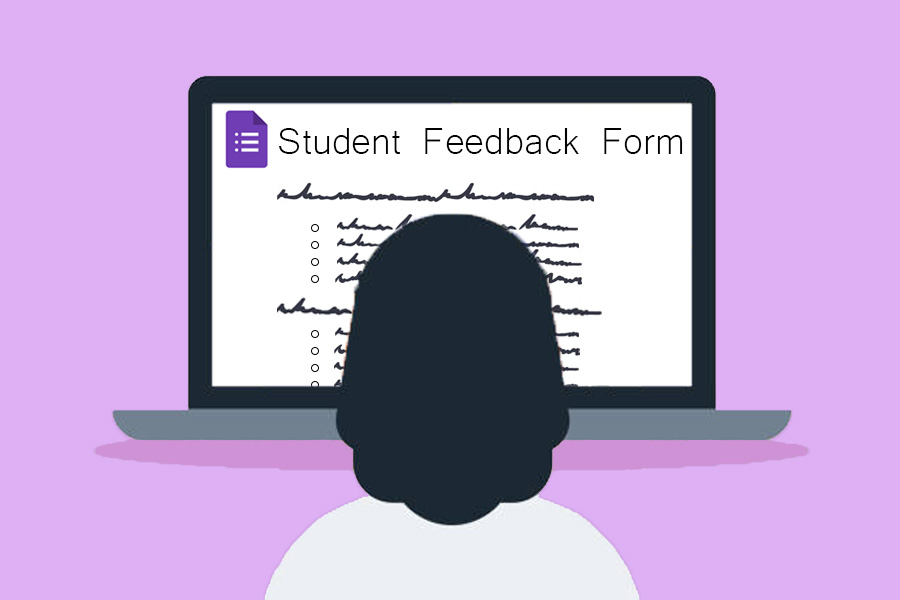Students’ voices matter: teachers would benefit from anonymous feedback
Administrators should implement a feedback system that would allow students to share anonymous comments about their teachers.
January 17, 2022
“Why do teachers even bother me with this?” I ask myself. “It’s not like they’re actually going to change their ways.”
I can’t get this thought out of my head whenever I see an email in my MCPS inbox with the subject line “FEEDBACK REQUEST.” This message signals that a teacher has sent my peers and me a survey on Google Forms so we can provide comments on their methods of instruction. While these requests signify the educators’ desire for improvement, it can be intimidating to reveal complaints since students often need to put their names on the forms.
When students actually feel comfortable sharing their concerns, their feedback can help improve the quality of teaching in school. Whitman should implement a centralized feedback system that would allow students to share anonymous comments about all of their teachers with administrators.
Since it is currently up to each educator to decide whether they will ask for feedback, not all students feel that teachers take their ideas into account.
“I think that the biggest issue with the current system is that only some teachers do it,” junior Micah Janger said. “I think all teachers should have some form of feedback that students can do.”
In an informal Black & White survey of 31 students, more than 80% of respondents said that offering feedback directly to a superior feels like a daunting task. In addition, 61.3% of the students doubted that their teachers took the responses to their feedback forms into account.
Luckily, a centralized feedback system would address students’ lack of faith in the significance of their constructive criticism. By receiving anonymity, students would know that there would be no way for teachers to track who provided which comments. Additionally, implementing oversight from administrators could help students take the feedback forms more seriously because they would know that the staff could step in if a large number of students reported similar concerns.
“A centralized system to give feedback to teachers is very needed,” sophomore Mitra Hu-Henderson said. “I think the school isn’t doing enough to accommodate certain learning styles and the best way for students to succeed. Students need an outlet to explain why a teacher’s teaching style, grading style or test style isn’t helping them learn.”
Many teachers have realized that to maximize their teaching abilities, they need to gain constructive criticism so they can become more effective educators each year.
“As a teacher, you should have a growth mindset,” said social studies teacher Kenneth Heckert. “It’s important that you’re always looking to improve upon what you’ve done to help students be successful in the classroom. Over the years, I have gotten lots of valuable feedback that’s helped me improve as a teacher.”
It’s also important to note that currently, administrators don’t receive any student feedback on teachers unless pupils take the initiative to approach the higher-ups directly. The people in charge of our school have no way of staying up to date with students’ feelings about their instruction, which means that administrators have no way to tell teachers if there is anything they need to act on.
A centralized feedback system would fill this knowledge gap. Administrators could create an anonymous form that they would email to every student. From there, students could fill out the form anonymously. The staff could then convert the data into a Google spreadsheet, sort feedback by a teacher and send the corresponding information to each educator. This Google spreadsheet format would be particularly useful in helping administrators recognize a need for intervention if they receive lots of complaints regarding a particular teacher.
Some might argue that implementing this plan would require a substantial amount of work on the part of teachers and administrators. Whether this is true or not, the initiation of this feedback system would pay off in the long run. The more comprehensive feedback that educators receive, the more likely it is that they’ll use the input to improve their teaching strategies, helping every future student of theirs.
Schools exist so students can become informed. It’s only natural that instructors should, like their pupils, receive education — in the form of constructive feedback — so they can maximize the effectiveness of their teaching. Although we’re lucky to go to a school where some teachers already request feedback, there’s always room for improvement in the system; that idea applies to our educators’ teaching methods, too.







